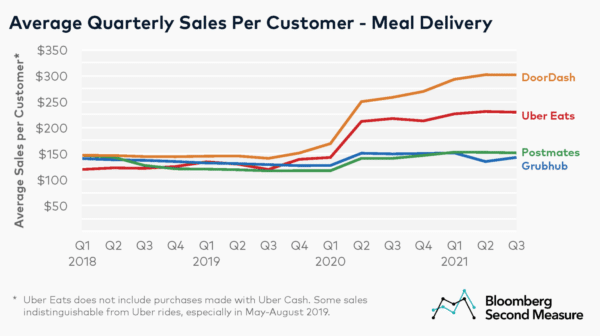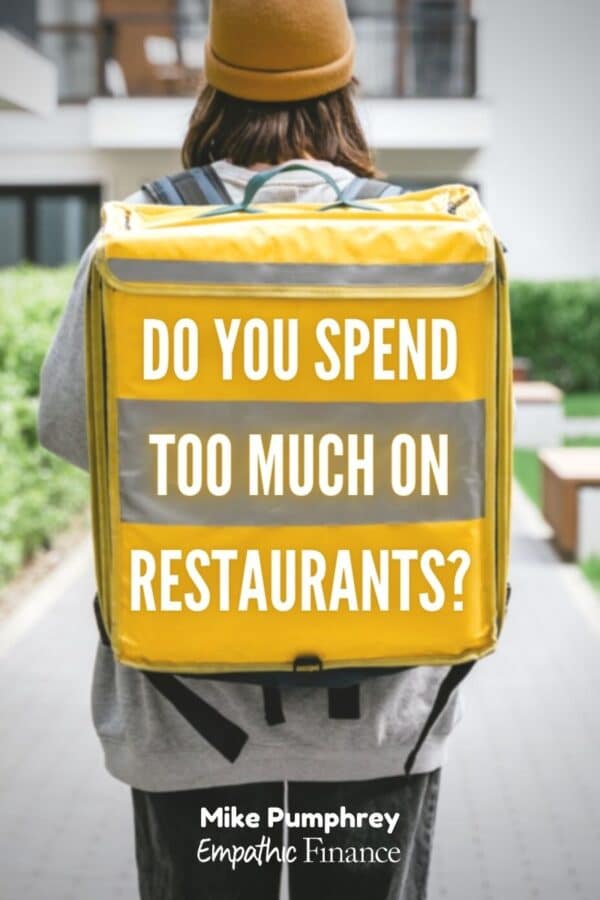It’s common for people to say that they spend “too much” on restaurants and other food delivery services, but why? And is it true?
If there’s one thing I hear from basically everyone, whether they are a client, a prospective client, a friend, or a random person that I chat with about money, it’s that they all at some point say the same phrase:
“I spend too much money on restaurants.”
Some people replace “restaurants” with their food conveyance of choice—DoorDash, Uber Eats, GrubHub, etc.—but it’s always the same; a just-in-time food preparation service, delivered to your door.
The statistics around this are not for the faint of heart. According to a survey published by LendingTree 45% of Americans used a food delivery service, with 92% of Gen Z and 89% of millennials doing it.
And the amount of money being spent on food delivery has increased over time as well. According to Bloomberg, in the third quarter of 2021, DoorDash customers spent an average of $302, with Uber Eats, Postmates, and GrubHub not far behind.

Now, most people would stop the conversation there. Spending “too much” money on restaurants is just something that you do, like complaining about your commute, or looking forward to the weekend, right?
Not me. I’m digging in.
But not for the reason you might think.

Table of Contents
Shame
So let’s be clear what’s going on. You probably have internalized a generalized shame about your spending.
This isn’t your fault. Our culture is really good at telling us how bad we are, with usually the only salve being to purchase whatever product they are selling. (See also: 98% of makeup products, weight loss solutions, etc.)
So you’ve been told by our culture that you shouldn’t (ooh, there’s that word!) spend as much money as you do on restaurants.
Why is this? I think it’s because of these theories:
- It’s financially wasteful, as food prepared at home is cheaper than food prepared for you
- It’s environmentally wasteful, as food prepared for you has takeout boxes and requires gas to be conveyed to you
- It’s a privilege, others don’t have the ability to do this, etc.
Now, you could make an argument for all of these things. But as I’ve said before, takeout food isn’t always cheaper. And if you want to use an environmental argument, I would instead suggest that your consumption of meat is much more environmentally impactful than the box that the food comes in.
So, we feel bad, but not bad enough to do anything about it. Which is the single worst type of feeling bad there is. I would much rather you feel bad enough about something that you are motivated to deal with it, rather than this low-watt ennui that saps your energy 24/7.
(Trivia: There is a word in English that means this; it’s called “velleity”. That word almost lent itself to an earlier version of this site.)
Get specific
Many financial people focus on budgeting as a way of reducing unnecessary spending. If you keep track of your spending, you’re more likely to spend less, and spending less is the goal, right?
Not so. At least, not so for me.
I’m much more interested in understanding the motivations behind our thoughts and feelings. I think that’s more likely to lead to greater insights and a more impactful plan of action, and less about feeling guilty, which does no one any good.
So let’s say that you believe you spend too much money on restaurants.
How much would be enough?
Because if you’re using the phrase “too much”, then there must be some metric to which you’re comparing to. You can’t say “too much” without context.
So what is that context?
I bet you don’t know it. So it’s time to find out.
How much do you spend now?
You have to actually figure out how much you’re currently spending on restaurants first.
Because how can you be spending “too much” if you don’t even know how much you’re spending?
I recommend you track your restaurant expenditures for a month. Of course every month is different, but one month will give you a got rough estimate as to what you do.
Once you have that figure, then you sit with it. What would you like that number to be? And why?
(If a whole month is hard to wrap your mind around, divide it by 30 to get a daily figure.)
Now this might seem handwavey, and indeed it is, but no more so than sitting there and blindly saying that you spend “too much”.
Is it really too much?
Now, there is only one case where the amount really is too much, and that’s if you are spending more than you make in a given month.
But restaurants are only part of the picture there. How much are you spending everywhere? What are your subscriptions, your Amazon purchases? How much is your car payment? There are a lot of things to figure out before you know that restaurants are the primary culprit.
So I recommend you track all of your spending, not just restaurants. You have to get your spending down to be less than what you make, otherwise, you are losing money and going to find yourself in debt. Not a good plan.
(If you sign up here, I’ll send you the tracking worksheet I use with my clients for free.)
Life is hard, get takeout
Putting aside all of the complexities, economic arguments, labor issues, etc., let’s be honest, getting food delivered to your door is awesome. You have at your fingertips menus from a galaxy of different restaurants, most of which will deliver to your door in less than an hour.
And let’s throw the moralizing out the door. Life is challenging these days. Yes, fewer people may need to tend the field or work in the factories, but we’ve replaced physical challenges with mental, emotional, and spiritual challenges. And if you’re a millennial, your life is likely harder than it was for your parents (although it’s probably hard for them too now, in different ways).
With all this in mind, if things are challenging, and you’ve determined that you can afford it, why not spend on restaurants? Intrinsically, I don’t see anything wrong with it. Can you make peace with these decisions?


